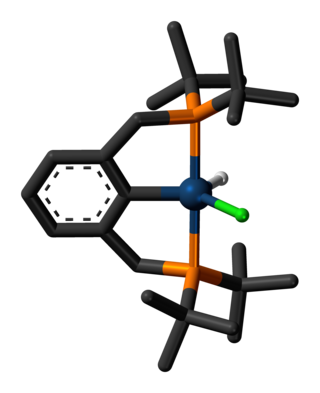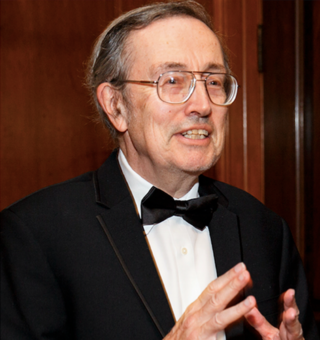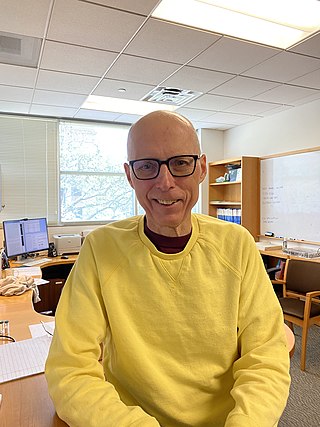Alan S. Goldman is an American chemist and Distinguished Professor of Chemistry at Rutgers University-New Brunswick. [1] Goldman's research area is homogeneous catalysis with emphasis on C-H activation. [2]

Alan S. Goldman is an American chemist and Distinguished Professor of Chemistry at Rutgers University-New Brunswick. [1] Goldman's research area is homogeneous catalysis with emphasis on C-H activation. [2]

Goldman has been recognized by numerous awards. He was awarded the ACS Catalysis Lectureship for the Advancement of Catalytic Science in 2018. [4] He received the ACS Award in Organometallic Chemistry in 2019 [5] and the Sir Geoffrey Wilkinson Award from the Royal Society of Chemistry (UK) in 2020. [6] In 2021, he was elected as a Fellow of the American Association for the Advancement of Science. [7]
In chemistry, dehydrogenation is a chemical reaction that involves the removal of hydrogen, usually from an organic molecule. It is the reverse of hydrogenation. Dehydrogenation is important, both as a useful reaction and a serious problem. At its simplest, it's a useful way of converting alkanes, which are relatively inert and thus low-valued, to olefins, which are reactive and thus more valuable. Alkenes are precursors to aldehydes, alcohols, polymers, and aromatics. As a problematic reaction, the fouling and inactivation of many catalysts arises via coking, which is the dehydrogenative polymerization of organic substrates.

In chemistry, a transition metal pincer complex is a type of coordination complex with a pincer ligand. Pincer ligands are chelating agents that binds tightly to three adjacent coplanar sites in a meridional configuration. The inflexibility of the pincer-metal interaction confers high thermal stability to the resulting complexes. This stability is in part ascribed to the constrained geometry of the pincer, which inhibits cyclometallation of the organic substituents on the donor sites at each end. In the absence of this effect, cyclometallation is often a significant deactivation process for complexes, in particular limiting their ability to effect C-H bond activation. The organic substituents also define a hydrophobic pocket around the reactive coordination site. Stoichiometric and catalytic applications of pincer complexes have been studied at an accelerating pace since the mid-1970s. Most pincer ligands contain phosphines. Reactions of metal-pincer complexes are localized at three sites perpendicular to the plane of the pincer ligand, although in some cases one arm is hemi-labile and an additional coordination site is generated transiently. Early examples of pincer ligands were anionic with a carbanion as the central donor site and flanking phosphine donors; these compounds are referred to as PCP pincers.
Alkane metathesis is a class of chemical reaction in which an alkane is rearranged to give a longer or shorter alkane product. It is similar to olefin metathesis, except that olefin metathesis cleaves and recreates a carbon-carbon double bond, but alkane metathesis operates on a carbon-carbon single bond.

Robert Howard Crabtree is a British-American chemist. He is serving as Conkey P. Whitehead Professor Emeritus of Chemistry at Yale University in the United States. He is a naturalized citizen of the United States. Crabtree is particularly known for his work on "Crabtree's catalyst" for hydrogenations, and his textbook on organometallic chemistry.
David Milstein is an Israeli chemist studying homogeneous catalysis.
Gábor Laurenczy is a Hungarian-Swiss chemist and academic. He is a Professor Emeritus at the École Polytechnique Fédérale de Lausanne. He is academician, External Member of the Hungarian Academy of Sciences.
Melanie Sarah Sanford is an American chemist, currently the Moses Gomberg Distinguished University Professor of Chemistry and Arthur F. Thurnau Professor of Chemistry at the University of Michigan. She is a Fellow for the American Association for the Advancement of Science, and was elected a member of the National Academy of Sciences and the American Academy of Arts and Sciences in 2016. She has served as an executive editor of the Journal of the American Chemical Society since 2021, having been an associate editor of the since 2014.

Adam S. Veige is a professor of Chemistry at the University of Florida. His research focuses on catalysis and the usage of inorganic compounds, including tungsten and chromium complexes.
Karen Ila Goldberg is an American chemist, currently the Vagelos Professor of Energy Research at University of Pennsylvania. Goldberg is most known for her work in inorganic and organometallic chemistry. Her most recent research focuses on catalysis, particularly on developing catalysts for oxidation, as well as the synthesis and activation of molecular oxygen. In 2018, Goldberg was elected to the National Academy of Sciences.
R. Tom Baker is an inorganic chemist known for the development and application of inorganic transition metal-based catalysis.
William B. Tolman an American inorganic chemist focusing on the synthesis and characterization of model bioinorganic systems, and organometallic approaches towards polymer chemistry. He has served as Editor in Chief of the ACS journal Inorganic Chemistry, and as a Senior Investigator at the NSF Center for Sustainable Polymers. Tolman is a Fellow of the American Association for the Advancement of Science and the American Chemical Society.
T. Don Tilley is a professor of chemistry at the University of California, Berkeley.

Paul James Chirik is an American chemist known for his work in sustainable chemistry using Earth-abundant metals like iron, cobalt, and nickel to surpass the performance of more exotic elements traditionally used in catalysis. He is the Edwards S. Sanford Professor of Chemistry and chair of the chemistry department at Princeton University.
Suzanne A. Blum is an American professor of chemistry at the University of California, Irvine. Blum works on mechanistic chemistry, most recently focusing on borylation reactions and the development of single-molecule and single-particle fluorescence microscopy to study organic chemistry and catalysis. She received the American Chemical Society's Arthur C. Cope Scholar Award in 2023.

Vy Maria Dong is a Vietnamese-American Chancellor's Professor of Chemistry at the University of California, Irvine (UCI). Dong works on enantioselective catalysis and natural product synthesis. She received the Royal Society of Chemistry's Merck, Sharp & Dohme Award in 2020, the American Chemical Society's Elias James Corey Award in 2019, and the UCI's Distinguished Alumni Award in 2018.

Iwao Ojima is a Japanese-American chemist and university distinguished professor at the State University of New York at Stony Brook. He has been widely recognized for his seminal contributions to a range of chemical research at the multifaceted interfaces of chemical synthesis and life sciences. As rare accomplishments, he has received four National Awards from the American Chemical Society in four different fields of research. He is also serving as the director of the Institute of Chemical Biology and Drug Discovery (ICB&DD), as well as the president of the Stony Brook Chapter of the National Academy of Inventors.

John A. Gladysz, an organometallic chemist, is a Distinguished Professor and holds the Dow Chair in Chemical Invention at Texas A&M University. Professor Gladysz is a native of the Kalamazoo, Michigan area. He obtained his B.S. degree from the University of Michigan (1971) and his Ph.D. degree from Stanford University (1974). He subsequently held faculty positions at UCLA (1974-1982) and the University of Utah (1982-1998). He then accepted the Chair of Organic Chemistry at the University of Erlangen-Nuremberg in Germany. In 2008, he returned to North America as a distinguished professor and holder of the Dow Chair in Chemical Invention at Texas A&M University.
Metal-ligand cooperativity (MLC) is a mode of reactivity in which a metal and ligand of a complex are both involved in the bond breaking or bond formation of a substrate during the course of a reaction. This ligand is an actor ligand rather than a spectator, and the reaction is generally only deemed to contain MLC if the actor ligand is doing more than leaving to provide an open coordination site. MLC is also referred to as "metal-ligand bifunctional catalysis." Note that MLC is not to be confused with cooperative binding.
Dr. Daniel Mindiola, a Venezuelan chemist, is the Brush Family Professor of Chemistry at the University of Pennsylvania. He specializes in inorganic and organometallic synthesis, catalysis, and mechanistic chemistry. He has over 200 peer-reviewed scientific publications.

Paula L. Diaconescu is a Romanian-American chemistry professor at the University of California, Los Angeles. She is known for her research on the synthesis of redox active transition metal complexes, the synthesis of lanthanide complexes, metal-induced small molecule activation, and polymerization reactions. She is a fellow of the American Association for the Advancement of Science.